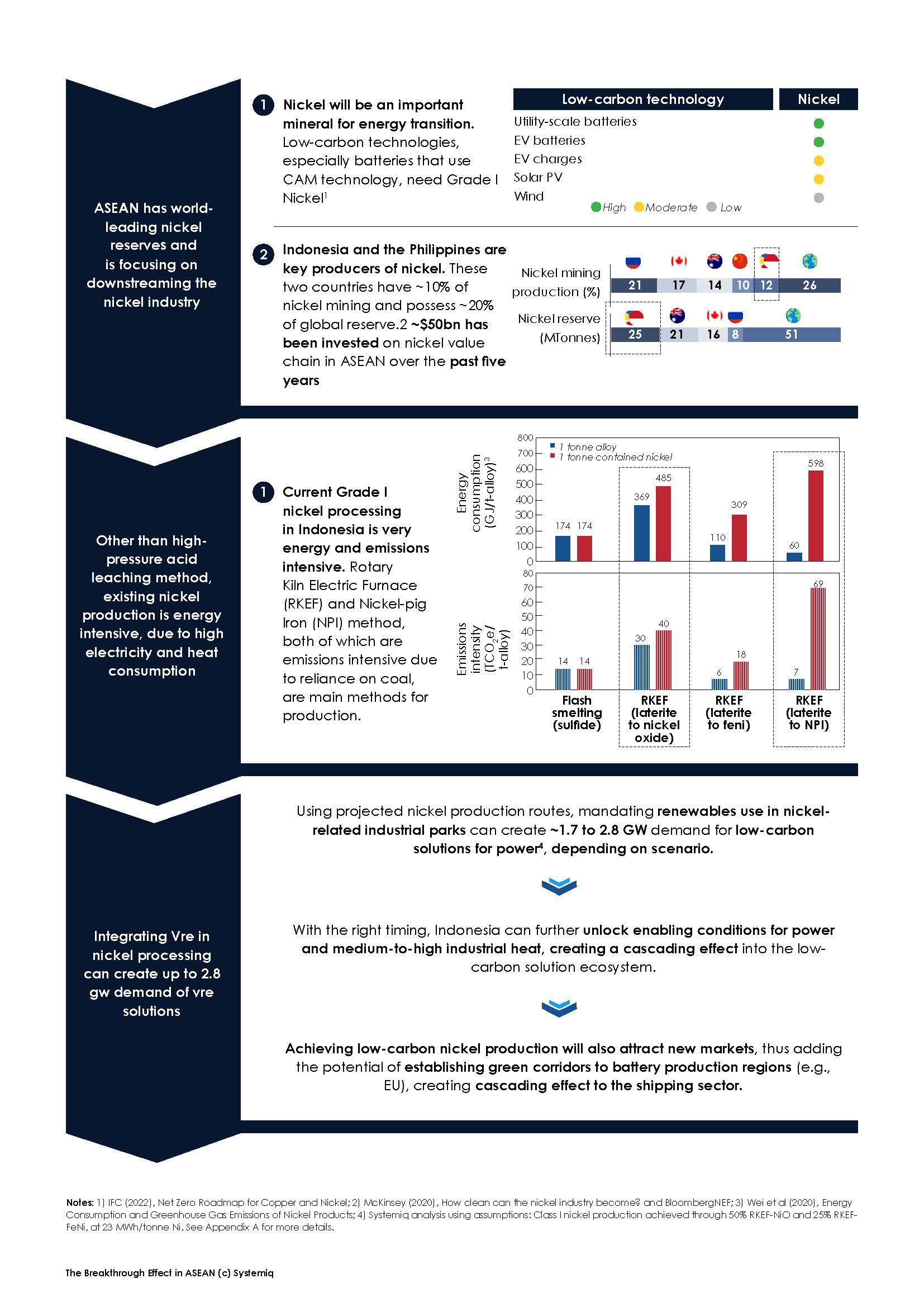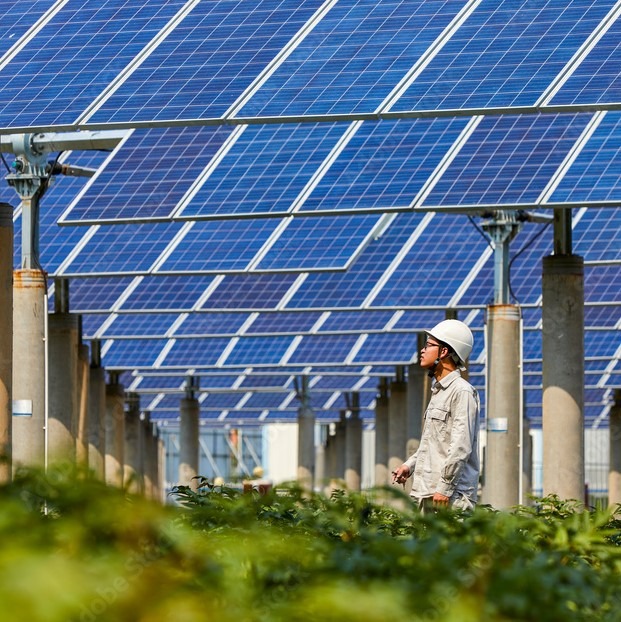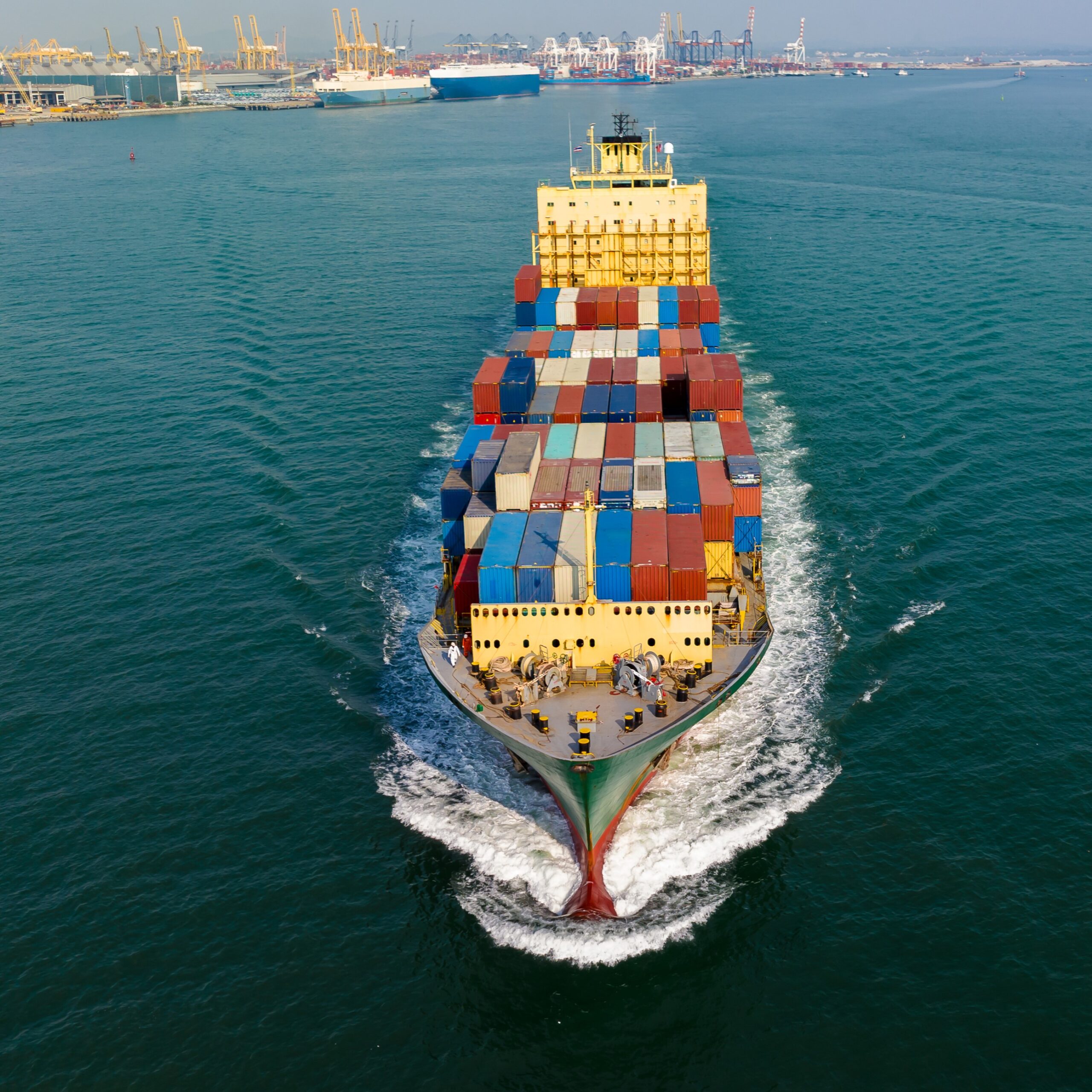A cascade of positive tipping points for zero-carbon solutions, in sectors covering half of ASEAN’s emissions, could be triggered by just two ‘super-leverage points’, says The Breakthrough Effect in ASEAN.
The report shows how the public and private sectors can use tipping points to decarbonize industries in some of the world’s most climate-vulnerable countries – including Indonesia, Myanmar, Thailand and Vietnam.
A report on the Association of Southeast Asian Nations shows that two low-carbon interventions could enable high-emitting sectors of the region’s economy to move rapidly towards zero emissions.
Launched today by Systemiq and the Indonesian Chambers of Commerce’s (KADIN) Net Zero Hub, the analysis in The Breakthrough Effect in ASEAN examines key industries such as power, road transport, industrial heat, shipping and mineral refining.
What are positive tipping points?
Positive economic change doesn’t happen in a straight line. A tipping point happens when a zero-carbon solution advances to a point where it outcompetes the existing high-carbon solution. Once reached, self-reinforcing “feedback loops” drive exponential growth in the adoption of the new solution and a rapid decline of the old.
Why is this so important for ASEAN?
ASEAN is one of the most fossil-fuel-dependent regions. But it is also on the cusp of a series of tipping points, with the price of low-carbon solutions now close to matching existing high-carbon ones – and implementing policies that support these technologies could be the key to unlocking this green growth.
The region is one of the most climate-vulnerable in the world, with the impacts of climate change threatening to cut the region’s GDP by 35% by 2050. It is also central to global decarbonization efforts due to its wealth of natural resources that supply the world’s EV markets, with Indonesia containing 22% of global nickel reserves while 18% of the global rare earth reserves are in Vietnam. Located at the crossroads of international trade routes, contributing to at least 10% of the world’s shipping volume, it also has the potential to pioneer low-carbon shipping across the globe.
How could tipping points help ASEAN’s economy?
The Breakthrough Effect in ASEAN recommends mandates for electric two-wheelers, buses and renewable energy in industrial parks that produce nickel, as well as a series of additional actions across the five priority sectors to fully unlock ASEAN’s green growth.
A mandate for two wheelers – which are now the same price as their polluting counterparts – and buses could boost the uptake of EVs in the road transport sector, which would have a positive impact on the other key industries by driving demand.
The growth of the EV industry will increase demand for nickel – one of the key materials used in lithium batteries. To ensure that this critical mineral is produced sustainably, the report recommends mandating renewable energy in industrial parks where it’s processed – this would also drive demand for clean energy and create green shipping corridors between ASEAN and major import markets like the EU and USA.
These interventions will need to be complemented by efforts to drive down prices, including private investment in batteries and solar power, a streamlining of the national coal phase-out, and targeted government subsidies for EV manufacturers, which have already had major success in India – boosting electric bus sales by up to 308%.
Deeper dive - ASEAN’S TIPPING POINTS BY SECTOR
Reactions to "The Breakthrough Effect in ASEAN"
”Indika is already actioning the targets set out in “The Breakthrough Effect in ASEAN”… We have diversified to three of the six priority sectors identified in the report, namely electric two-wheelers (Alva), electric buses (INVI), and the power sector through green energy investments. We see net zero as the only future for us and “The Breakthrough Effect in ASEAN” has reinforced our commitment. I hope more will join us in tapping into this green growth opportunity, collectively bringing forward positive tipping points to accelerate the transition into a net-zero economy.
Azis ArmandVice President Director and CEO of PT Indika Energy
”The UN's Global Stocktake synthesis report shows that despite some progress, the world is still far off track from reducing emissions enough to keep temperature rise to safe levels.
Nirata ‘Koni’ SamadhiCountry Director at World Resources Institute (WRI) Indonesia
How policymakers, business leaders and others respond to the Global Stocktake findings at COP28 will help determine whether the world confronts the climate crisis or continues to fall victim to it.
The Breakthrough Effect in ASEAN is a great analytical reference to understand the most potential low-carbon solutions need to be activated in ASEAN region to help ASEAN policymakers, business leaders and others making right decisions and effective actions in achieving our global climate targets.
”Understanding climate intersectionality is critical in strengthening climate action and in reimagining how climate funding is being mobilized.
Tristan AceChief Product Officer of AVPN
As Asia’s number 1 social investor network, AVPN have actively promoted this understanding through our Climate Pathfinders program. The program aims to help decision-makers of philanthropic organizations and other grant-making bodies to propel progress in critical areas to reshape the regional policy agenda and enable the more effective deployment of capital towards climate action. We look forward to leveraging “The Breakthrough Effect in ASEAN” insights to collectively galvanize public-private-philanthropic actions into the transition.
”We are committed to support the Indonesian government’s commitment to reduce greenhouse gas emissions, including measures to achieve net-zero emissions by 2060 or earlier. We aim to do by this by transforming into a bigger, greener Adaro by expanding into transition minerals and renewable power such as solar, wind and hydro.
Dharma DjojonegoroCEO of Adaro Power
The Breakthrough Effect in ASEAN complements our efforts by pinpointing, both for companies and governments, the opportunities for investments and barriers that must be removed so that change become irresistible and unstoppable for the region’s green ecosystem.
”The Breakthrough Effect in ASEAN is a foundational piece of work for the Hub. It sets the framework for the conditions and levers to reach sectoral tipping points that can unlock ASEAN’s green growth. With this framework, private and public sector have a common target to realize – ensuring smarter decisions to effectively translate the vision into action. We look forward to work together with businesses and the government to unlock these tipping points for a better ASEAN and a better Indonesia.
Dharsono HartonoChairman Indonesian Chambers of Commerce and Industry’s (KADIN) Net Zero Hub and Carbon Center of Excellence
”The Breakthrough Effect in ASEAN has immense potential to unlock tipping points in this region. This will help not only to drive decarbonization, but also allow countries in the region to secure their places as leaders in the zero-carbon transition. We know that we need to move from incremental change to systems change that takes off swiftly, and the Bezos Earth Fund is thrilled to support this work that will trigger those transitions.
Kelly LevinChief of Science, Data and Systems Change at the Bezos Earth Fund
”The numbers are clear on the funding gap for climate. We should be investing $2.4 trillion per year in net-zero solutions in emerging economies and developing countries (excluding China). Right now, we are only reaching 20% of this target. While the gap in climate funding (‘what’) is widely acknowledged, there is less clarity on understanding the reasons (‘why’) behind it and the strategies (‘how’) to close this gap. The Breakthrough Effect in ASEAN offers a blueprint by identifying the opportunities for breakthroughs in net-zero solutions within ASEAN and outlines both the reasons (‘why’) behind seizing these opportunities and the strategies (‘how’) to unlock them.
Mari PangestuSpecial Envoy for the G20 Bali Global Blended Finance Alliance, Former World Bank Managing Director of Development Policy and Partnerships
”The green transition is the global growth story of the 21st century. We need to ensure ASEAN as a region seizes the green growth opportunity in the next decade. I urge governments, investors and business leaders in ASEAN to use this foundational study to understand which actions they can prioritize today to drive the level of emissions cuts needed to get us on track for limiting global temperature rise to 1.5oC. It is encouraging to see low-carbon solutions in the power and road transportation sectors in ASEAN are already reaching cost parity with high-emitting incumbents. Supporting these technologies even more through enabling policies and smart investments could trigger tipping points faster. Working hand in hand across companies and with governments, we can seize this opportunity. The time is now.
Shinta KamdaniCoordinating Vice Chairman for Maritime, Investment and Foreign Affairs at the Indonesia Chambers of Commerce and Industry (KADIN)
”INA focuses on investing in green energy and transformation as part of its commitment to responsible investing. We are committed to support Indonesia in moving towards a sustainable energy future. The Breakthrough Effect in ASEAN helps us in realizing this by identifying opportunities for investments in low-carbon solutions that can create significant growth and value, speeding up the shift towards a net-zero world.
Arief BudimanDeputy CEO of Indonesia Investment Authority (INA)
”Six of nine planetary boundaries that regulate the stability and resilience of the Earth system have been transgressed – suggesting that Earth is now well outside of the safe operating space for humanity. In the face of these negative climate tipping points, we are now also seeing the shift to a low-carbon economy picking up speed. We are finally waking up to the challenges facing all our economies, and governments and businesses are doing more than ever to decarbonize and support a more sustainable kind of growth. However, we are still not moving fast enough. The key now will be getting a critical mass of leaders to drive their nations and industries towards critical positive tipping points in adoption of low-carbon solutions, in order to accelerate our transition. The Breakthrough Effect in ASEAN shows how governments and companies can do precisely this, and unlock tremendous opportunities as a result.
Paul PolmanBoard member at Systemiq and co-author of “Net Positive: how courageous companies thrive by giving more than they take”Status: Approved
”The original ‘Breakthrough Effect’ report painted a global picture focused on the technological developments which will be relevant across the world. But specific tipping points will differ by country or region as global technology trends interact with differences in local renewable resources, consumption patterns and local policy settings. Insights on likely tipping points are most actionable when understood at this country/regional specific level. The Breakthrough Effect in ASEAN explores when and where across the region tipping points of falling cost or growing demand will create investment opportunities, and sets out the actions that should be taken by governments and companies to accelerate the shift towards a net-zero economy.
Adair TurnerChair, Energy Transitions Commission
”The Breakthrough Effect in ASEAN report demonstrates the importance of supporting disruptive technologies to solve climate challenges and the need for catalytic capital from philanthropy to help scale early-stage solutions. ASEAN can be a petri-dish for these solutions to grow at a global scale.
Ng Boon HeongCEO of Temasek Foundation
”The Breakthrough Effect in ASEAN” offers concrete solutions to trigger socioeconomic tipping points that could unlock these opportunities in prioritized sectors most relevant to the region. Amazon is the world’s largest corporate purchaser of renewable energy, and on a path to powering its global operations with 100% renewable energy by 2025. ASEAN economies can do much more to increase the availability and affordability of renewable energy—and massively scale opportunities for inbound corporate investments in this space in the process. The report identifies specific recommendations in this regard, including leveling the playing field for renewable power project developers, and enabling direct investments (via power purchase agreements) for corporate consumers. We hope ASEAN government leverage corporate consumer demand to boost the renewable energy sector, as this will also bring associated capital, green jobs, the proliferation of green technologies, and a tangible opportunity to meet national climate targets.
Genevieve DingHead of Sustainability Strategy Policy for APAC and Japan, co-author of the 2023 Green Economy Report
”Electric two-wheelers are not just an opportunity to decarbonize, but also a huge growth opportunity for Indonesia and for the wider ASEAN region. Looking at The Breakthrough Effect in ASEAN framework, there is definitely a lot of room to improve in terms of hitting both affordability and attractiveness. Existing products are usually affordable but not very attractive, or the other way around. At MAKA Motors, our goal is to develop a product that is both affordable and attractive for Indonesian users. We take an R&D-first approach to ensure we have the best product at the right price. We hope more players in the industry across ASEAN will join us in seizing this huge growth opportunity as the Breakthrough Effect in ASEAN has clearly highlighted.
Raditya WibowoFounder and CEO of MAKA Motors
”ASEAN is an important and one of the world’s most climate-vulnerable regions that still heavily relies on fossil fuels. This is where key zeroemissions technologies deployment can help speed up the transition away from the highly emitting incumbents. To do so, however, it requires political decisions and commitment from governments to ensure that there are strong policies and regulations in place to support and accelerate the transition. Energy planners need to understand about these net-zero technologies so that they can be featured in respective long-term energy plans, leaving the highly emitting incumbents behind. “The Breakthrough Effect in ASEAN” report captures exactly what governments and the private sector could do to bring about “tipping points” in several key energy sub-sectors in the region.
Fabby TumiwaExecutive Director of the Institute for Essential Services Reform








